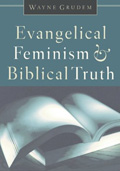
Wayne Grudem
Reviewed by: George W. Knight III
Evangelical Feminism and Biblical Truth, by Wayne Grudem. Published: by Multnomah, 2004. Paperback, 858 pages, list price $29.99. Reviewed by Dr. George W. Knight III.
Dr. Wayne Grudem, Westminster and Cambridge graduate, and professor of Bible and theology at Phoenix Seminary, is the premier writer on the roles that God has prescribed for men and women in Scripture. Especially his analysis (in chapters 3-12) of the more than one hundred arguments advanced by evangelical feminists since 1991 makes this book invaluable.
Grudem provides in chapters 1-2 a positive view of men and women in their similarities and differences as created by God. In chapter 13, he argues that many of the egalitarian arguments reveal a trend to deny the full authority of the Bible. In chapter 14, he surveys the positions of many evangelical denominations and parachurch organizations on this issue. Grudem concludes that one must choose between evangelical feminism and biblical truth.
The appendixes contain much helpful material. In one, he lists over fifty ancient texts in which the Greek word for "head" means "person in authority." In another, he lists all eighty-two passages in which the word for "exercise authority" (1 Tim. 2: 12) occurs in ancient Greek literature. These are given in English translation.
There is a little to critique in this book. First, Grudem believes that virtually all of the extraordinary spiritual gifts (including prophecy) continue. Second, he permits women to be deacons (p. 94), but only "in churches where this does not involve governing authority over the entire congregation." In a footnote, he adds that "some people may wish to restrict deacons to men based on 1 Timothy 3: 12."The OPC has agreed with the footnote, since Paul explicitly describes deacons as men in that passage and does not apply the term deacon to the women mentioned in 1 Timothy 3: 11. Also, the apostles in Acts 6: 3 direct the congregation to elect a group of "men" (using a Greek word that refers to males) to care for the needy, especially widows. The bib- lical data demands that we use the official term "deacons" only for men.
And third, Grudem treats 1 Corinthians 14: 33b-35 (requiring women to "keep silent" and not "speak" in church) as referring to the judging or weighing of what the prophets have said (pp. 234-35), but not to the giving of "a lesson" (ESV) or "a teaching" (NASB) - verbal activity also mentioned in the summary introductory verse of 1 Cor. 14:26. The other activities (except singing) are handled in verses 27-32, leaving the teaching for verses 33b-35. The forbidden activity in 1 Corinthians 14: 33b-35 also parallels what we find in 1 Timothy 2: 11-12, where the speaking prohibited in verse 11 is said to be "teaching" in verse 12.
But these critiques do not affect the main parts of the work. Overall, it is such a capable handling of the objections to the prima facie teaching of the Bible that it deserves to stand, as an important supplement, alongside the earlier work that John Piper and Wayne Grudem edited, Recovering Biblical Manhood and Womanhood: A Response to Evangelical Feminism (1991).
April 14, 2024
How to Read and Understand the Psalms
April 07, 2024
March 31, 2024
My Grandmother Is Praying for Me
March 24, 2024
March 17, 2024
Safeguards: Shielding Our Homes and Equipping Our Kids
March 10, 2024
Ten Words from God: An Exposition of the Ten Commandments
March 03, 2024
Reactivity: How the Gospel Transforms Our Actions and Reactions
© 2024 The Orthodox Presbyterian Church